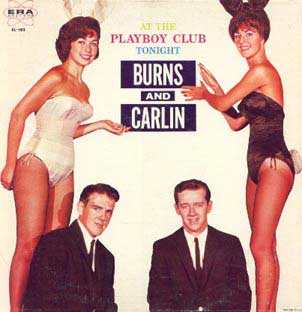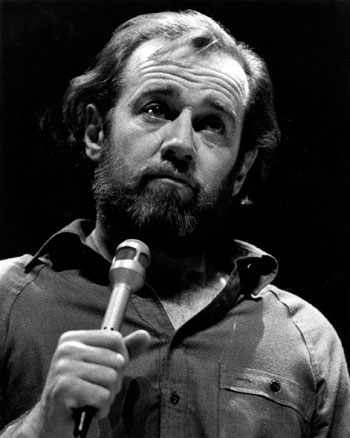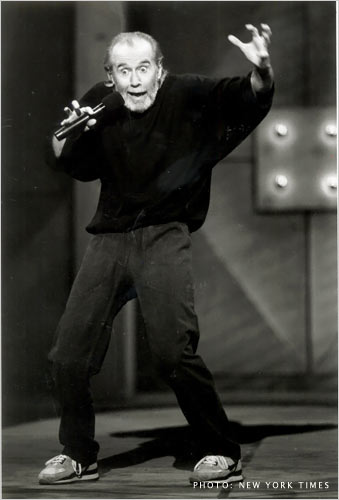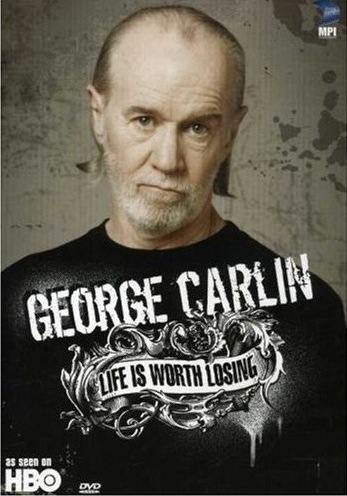Whither Uncle Dave?
A Tribute to George Carlin
By David McGee
George Carlin: May 12, 1937-June 22, 2008
I am a modern man. A man for the millennium. Digital and smoke free. A diversified, multicultural, postmodern deconstructionist, politically, anatomically and ecologically incorrect. I've been uplinked and downloaded, I've been inputted and outsourced. I know the upside of downsizing, I know the downside of upgrading. I'm a high-tech lowlife, a cutting edge, state of the art, bicoastal, multitasker, and I can give you a gigabyte in a nanosecond. I'm new wave, but I'm old school, and my inner child is outward bound. I'm a hot-wired, heat seeking, warm hearted cool customer, voice activated and biodegradable. I interface with my database, and my database is in cyberspace, so I'm interactive, I'm hyperactive, and from time to time I'm radioactive. Behind the eight ball, ahead of the curve, riding the wave, dodging the bullet, pushing the envelope. I'm on point, on task, on message and off drugs. I've got no need for coke and speed; I've got no urge to binge and purge. I'm in the moment, on the edge, over the top but under the radar. A high concept, low profile, medium range ballistic missionary. A streetwise smart bomb, a top gun bottom feeder. I take power naps, I run victory laps. I'm a totally ongoing big foot slam dunk rainmaker with a proactive outreach; a raging alcoholic, a working rageaholic, out of rehab and in denial. I got a personal trainer, a personal shopper, a personal assistant and a personal agenda. You can't shut me up, you can't dumb me down, 'cause I'm tireless and I'm wireless, I'm an alpha male on beta blockers. I'm a non-believer and an overachiever, laid back but fashion forward. Up front, down home, low rent, high maintenance. Super sized, long lasting, high definition, fast acting, oven ready and built to last. I'm a hands-on, footloose, knee-jerk head case, prematurely post-traumatic, and I have a love child who sends me hate mail. But I'm feeling, I'm caring, I'm healing, I'm sharing, a supporting, bonding, nurturing primary caregiver. My output is down but my income is up; I take a short position on the long bond, and my revenue stream has its own cash flow. I read junk mail, I eat junk food, I buy junk bonds, I watch trash sports. I'm gender-specific, capital-intensive, user friendly and lactose intolerant. I like rough sex, I like tough love, I use the f-word in my e-mail, and the software on my hard drive is hard core-no soft porn. I bought a microwave at a mini mall; I bought a minivan at a mega-store. I eat fast food in the slow lane. I'm toll-free, bite-size, ready to wear and I come in all sizes. A fully equipped, factory authorized, hospital tested, clinically proven, scientifically formulated medical miracle. I've been pre-washed, pre-cooked, pre-heated, pre-screened, pre-approved, pre-packaged, post-dated, freeze dried, double wrapped, vacuum packed and I have an unlimited broadband capacity. I'm a rude dude but I'm the real deal. Lean and mean. Cocked, locked and ready to rock. Rough, tough and hard to bluff. I take it slow, I go with the flow, I ride with the tide, I got glide in my stride. Driving and moving, sailing and spinning, jivin' and groovin', wailin' and winnin'. I don't snooze, so I don't lose. I keep the pedal to the metal and the rubber on the road. I party hearty and lunch time is crunch time. I'm hangin' in, there ain't no doubt and I'm hangin' tough. Over and out. -"Modern Man," the opening segment from George Carlin's 13th HBO special, 2005's Life Is Worth Losing.
George Carlin, born in New York City on May 12, 1937, died of a heart attack in Santa Monica, CA, on June 22, 2008. Multitudes of tributes poured in the following week, and YouTube was inundated with priceless Carlin clips. Pundits from across the political spectrum mulled the enduring impact of his "Seven Words You Can Never Say on Television" routine, a string of obscenities that was aired on New York radio station WBAI, prompting a FCC order prohibiting the words as indecent and leading to a 1978 Supreme Court decision upholding the FCC ruling and setting a decency standard that remains in effect. Much was made of his remarkable insider-outsider career, which found him thriving in the '60s as a button-down, clean cut, jacket and tie mainstream comic and actor (discharged from the Air Force as an “unproductive airman” in 1957, he teamed with Jack Burns to form a comedy duo two years later; the pair achieved some national recognition before splitting up in 1961) prior to his embrace of countercultural issues and lifestyles later in the decade. "I was entertaining the fathers and the mothers of the people I sympathized with, and in some cases associated with, and whose point of view I shared," he told author Tony Hendra in an interview for the book Going Too Far (Doubleday, 1987). "I was a traitor, in so many words. I was living a lie." Come 1970, he ditched his conservative appearance—and material—and re-emerged in casual wear with a beard and ponytail, an unabashed fondness for drugs, and an ever sharper wit now aimed mercilessly at hypocrites of every political, social, cultural and sexual persuasion.
Carlin began his career as one half of a comedy team with Jack Burns in Fort Worth, TX, where both worked for radio station KXOL. They made one album together, Burns and Carlin at the Playboy Club Tonight, in 1960 and split up in 1961 to pursue solo careers.
He was arrested multiple times on obscenity charges, all of which were dismissed. He had tax problems, drug problems (as late as 2004 he entered a rehabilitation center to be treated for alcohol abuse and an addiction to Vicodin), and health problems (a heart attack and two open-heart surgeries). He recorded four Grammy winning comedy albums, wrote best selling books expanding on the issues he confronted in his standup shows. He hosted the first episode of "Saturday Night Live" (which put him on a six-second delay in case he said anything naughty) and later starred in a short lived (less than 30 episodes) ABC-TV sitcom. His few movie appearances were unremarkable. But if network TV and the big screen were not hospitable to his artistry, cable TV most certainly was, because it brought the comic into millions of homes unabridged and unfettered. He soared, winning over new generation of young fans who identified with his anger and anti-establishment rants while retaining the affection of an older generation for whom his characters such as Al Sleet, “the hippy dippy weatherman” (“This Canadian low should not be confused with a Mexican high”), were icons. He became one of the most popular performers in the history of HBO on the strength of his 14 specials for the subscription cable channel. Prior to his death he learned he would be the recipient of the Mark Twain Prize for American Humor, to be awarded to him in November at the John F. Kennedy Center for the Performing Arts in Washington. (The prize now will be given posthumously and the evening is scheduled to be a tribute to Carlin's life and work.)
As the "Modern Man" bit quoted above indicates, Carlin exhibited a heightened sense of the import and the absurdity of words and jargon, and mocked a society that hides behind obfuscation instead of giving to us straight. Carlin, a brilliant writer in his own right, always gave it to his audiences straight. He didn't use profanity to shock, but rather as a means to emphasize the depth of his outrage at thoughtless, destructive or plain ridiculous behavior, whether it was politicians at the highest level, obese Americans, middle aged white men wearing baseball caps turned backwards, or unruly children (especially the obese offspring of obese parents). He rarely attacked politicians by name—in a recent interview he described his approach to political humor as "glancing blows"—but instead advanced a dark humor in examining the fallout from inept leadership as it affected a powerless or, indeed, apathetic populace. In the top ranks of contemporary comedians, he had no peer when it came to the artful use of language to make a clear, concise, cutting point. To that end, he had learned from the best: his grandfather once wrote out by hand all the works of William Shakespeare, the better to savor the immortal Bard’s mastery of words in all their complex shadings and nuances. In the seemingly stream of conscious litany that is the “Modern Man” bit quoted above can be found pretty much all the comic’s contradictions and all his strong suits, in the personalization of the general and the generalization of the personal, to put it in Carlinesque terms. But you know a man of words such as Carlin must have gone through countless drafts to arrive at the final, dazzling version—from such devotion to precision and clarity are multitudes of laughs engendered.
In an op-ed piece published in The New York Times on June 24 (headlined "Dying Is Hard, Comedy Is Harder"), Jerry Seinfeld, an acute analyst of comedic structure, recounted how, on numerous occasions, he would be tossing ideas around with other comics when invariably one would remind all, "Carlin does it. Carlin did it eight years ago." He offered effusive praise for the energy and intellect with which Carlin crafted his material, observing: "He worked over an idea like a diamond cutter with facets and angles and refractions of light. He made you sorry you ever thought you wanted to be a comedian. He was like a train hobo with a chicken bone. When he was done there was nothing left for anybody."
The closing two bits in the Life Is Worth Losing special most vividly demonstrate Seinfeld's point. Titled "Excess: Fires and Floods" and "Coast-to-Coast Emergency," these perfervid speculations and doomsday scenarios are Carlin at his sharpest, railing against our disastrous stewardship of the environment not by citing statistics and feigning outrage, but with a searing blend of wit and imagination in envisioning a cataclysmic event spurring a series of ever-escalating disasters on the west coast, resulting in both human beings and animals preying on each other as the rivers rise precipitously (making Carlin rapturous over the prospect of nature exacting revenge on the same people who couldn't be bothered to learn lessons from previous floods and actually move off the river—"natural disasters," he mused. "I can't get enough of 'em."). Fire rages out of control, consuming everything and everyone in its path, spreading across the continent to the east coast and heading north (bypassing Philadelphia "because Philadelphia's closed on the weekend" and detouring around New York City because the city tells the fire to engage in an anatomically impossible act with itself, "and it does! And it does!").
At this juncture Carlin revealed what set him apart as a comedian at a time when the art has been dumbed down by the likes of Dane Cook and Carlos Mencia. Acerbic and lacerating as he could be, George Carlin was a humanist. He understood H.L. Mencken dismissing common folk as “booboisie,” but he had no truck with such misanthropy. His attitude was more along the lines of, “He may be a jerk, but he’s my jerk.” At root, he wanted a better world for everyone, wanted people to wise up, be responsible, think, and don’t get fooled again. This, plus his assumption that his audience had the wits to follow verbal wordplay and came with at least a working knowledge of current events, gave every caustic comment and every perceptive insight a deeper resonance, made them food for thought and not merely cool jokes to repeat to your friends over drinks. No need to summarize it here; the man's own words are the finest tribute to his art, to his life and to what's been lost with his passing.
With the entire North American continent ablaze, another natural disaster occurs, described by Carlin as a huge thermal updraft creating an incendiary cyclonic macrosystem that forms a hemispheric megastorm, breaking down the molecular structure of the atmosphere and actually changing the laws of nature. Fire and water combine, burning clouds of flaming rain fall upward, gamma winds and solar rays ignite the ionosphere, creating huge clouds of ionized plasma. Bolts of lightning twenty million miles long begin shooting out of the North Pole and the sky fills up with green shit.
And then suddenly, the entire fabric of space/time splits in two; a huge crack in the universe opens and all the dead people from the past begin falling through—Babe Ruth, Groucho Marx, Davey Crockett, Tiny Tim, Porky Pig, Hitler, Janis Joplin, Allen Ludden, my Uncle Dave—your Uncle Dave. Everybody's Uncle Dave. An endless stream of dead Uncle Daves falling through the crack.
And all the dead Uncle Daves gather around a Heavenly kitchen table. They light up cigarettes and they begin to talk. They talk about how they never got a break. How their parents didn't love them and their children were ungrateful. They talk about how the government screwed them out of money and how they just missed out on a big job. They say the Jews own everything and the blacks get special treatment.
And all the hatred and bitterness drips out of these people and forms a big pool of liquid hate. And the pool of liquid hate begins to spin; 'round and 'round it spins, faster and faster, and the faster is spins the bigger it gets. Faster and faster, bigger and bigger until the whirling pool of hate is bigger than the entire universe. And then suddenly it explodes! Into trillions of tiny stars, and every star has a trillion planets, and every planet has a trillion Uncle Daves. And all the Uncle Daves have good jobs, perfect eyesight and shoes that fit. They have great sex lives and free health care. They understand the Internet, their kids think they're cool. And they all love their neighbors. And every week without fail, Uncle Dave wins the lottery, forever and every until the end of time, every single Uncle Dave has a winning ticket. And Uncle Dave is finally happy.
Now do you see why I like it when nature gets even with humans? Thanks for comin' in here tonight.
George Carlin always was Uncle Dave's ablest advocate. He is survived by his wife, Sally Wade; a daughter, Kelly Carlin McCall; and a brother, Patrick. His first wife, Brenda Hosbrook, died in 1997.
THE BLUEGRASS SPECIAL
Founder/Publisher/Editor: David McGee
Contributing Editors: Billy Altman, Derk Richardson
Logo Design: John Mendelsohn (www.johnmendelsohn.com)
Website Design: Kieran McGee (www.kieranmcgee.com)
Staff Photographers: Audrey Harrod (Louisville, KY; www.flickr.com/audreyharrod), Alicia Zappier (New York)
E-mail: [email protected]
Mailing Address: David McGee, 201 W. 85 St.—5B, New York, NY 10024
Founder/Publisher/Editor: David McGee
Contributing Editors: Billy Altman, Derk Richardson
Logo Design: John Mendelsohn (www.johnmendelsohn.com)
Website Design: Kieran McGee (www.kieranmcgee.com)
Staff Photographers: Audrey Harrod (Louisville, KY; www.flickr.com/audreyharrod), Alicia Zappier (New York)
E-mail: [email protected]
Mailing Address: David McGee, 201 W. 85 St.—5B, New York, NY 10024





